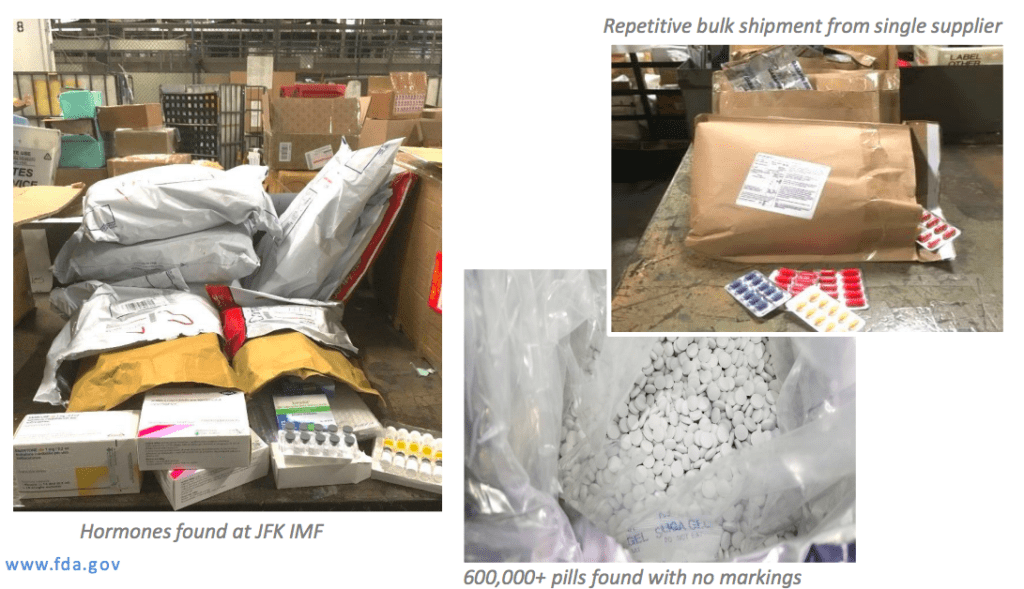Drug Importation and the Deadly Challenge of Screening 275 Million Packages a Year
 In a recent edition, the Los Angeles Times shared the story of the fruitless prosecution of a Shanghai-based Zheng fentanyl distribution organization that allegedly ships out 16 tons of illicit drugs a month. According to the LA Times, almost 29,000 Americans were killed last year by synthetic opioids such as fentanyl and its analogues, which they note is “a staggering surge from the 3,100 such deaths reported in 2013.”
In a recent edition, the Los Angeles Times shared the story of the fruitless prosecution of a Shanghai-based Zheng fentanyl distribution organization that allegedly ships out 16 tons of illicit drugs a month. According to the LA Times, almost 29,000 Americans were killed last year by synthetic opioids such as fentanyl and its analogues, which they note is “a staggering surge from the 3,100 such deaths reported in 2013.”
The LA Times story also described the way the Zheng organization has stayed ahead of regulators and police. As Chinese officials ban the production of one synthetic narcotic, the Zhengs adjusted their formula to a slightly different chemical composition to keep one step ahead of local enforcement.
Paul Knierim, Deputy Operations Chief with the Drug Enforcement Administration (DEA) explained to the LA Times, because dealers can buy fentanyl from China easily, there are “traffickers who are not affiliated with larger organizations or with cartels.”
In Congressional testimony offered by Mr. Knierim on this issue, he described how fentanyl seizures and fentanyl overdoses have increased exponentially in the last five years. There were 36,061 reports of fentanyl seizures in 2016, compared to only 1,024 seizures in 2013.
A Pew Trust article on the opioid crisis took a look at how fentanyl has remade the crisis by displacing the abuse of legitimate opioid medications with deadly fentanyl. “Fentanyl is cheap and easy to manufacture and smuggle, and it was involved in almost half of the more than 72,000 U.S. drug overdoses in 2017, according to the Centers for Disease Control and Prevention. The latest numbers show a sharp increase over 2012, when fentanyl was involved in only 6 percent of the more than 41,000 U.S. drug overdoses.”
In an opinion piece for The Hill Dr. Lynn Webster that until recently, legislative efforts as the state and Federal level missed “the disconnect between the amount of opioids prescribed and the number of drug overdoses. In fact there is an inverse relationship between the two.”
Dr. Webster and the Pew Trust also describe the challenges faced in policing packages imported into the United States. Dr. Webster points out that “the FDA, by its own admission, is not capable of inspecting more than 0.1 percent of the packages they presume contain drugs through the international facilities. This leaves a window of opportunity for huge amounts of illicit drugs to enter the States.”
The Pew Trust points out how time-consuming the screening process can be noting that even if agents find a package they suspect contains fentanyl, “it can take days to confirm because dealers continuously change the chemical formulas to elude law enforcement, according to Customs and Border Control.”
The Food and Drug Administration (FDA) in their report U.S. Food and Drug Administration and the International Mail Facilities (IMFs), describes the daunting job that Customs and Border Protection (CBP) faces when attempting to weed out counterfeit medications and packages containing illicit fentanyl. In 2017, IMFs received 275 million packages. Of these, 10,000 (0.004%) were screened by CBP, and of those 86% contained drugs. The investigation of a suspect package is incredibly time-consuming; an experienced FDA investigator might take as long as 20 minutes to process a package containing just on product.
Many of the packages that come into IMFs are presented as legitimate products. “Thousands of the packages entering through the IMFs contain what appear to be FDA regulated products. These packages include unapproved products; counterfeit or substandard drugs; purported dietary supplements being sold for weight loss, sexual enhancement, bodybuilding or pain relief that contain potentially dangerous undeclared drug ingredients; and, increasingly, products laced with the highly-potent opioid fentanyl.”
As PSM Board member Dr. Marv Shepherd pointed out, the STOP Act will aid IMFs in the detection of illegal shipments, going forward; “The international mail system has been a huge asset for fentanyl traffickers because their product can easily hide among the incredible volume of small packages coming through international mailports every day. By passing and enacting the STOP Act, Congress and the Administration have taken an important step to strengthen the electronic capabilities of customs authorities to assess which packages merit closer inspection. The loophole they’ve used to hurt and kill Americans is going to get smaller.”